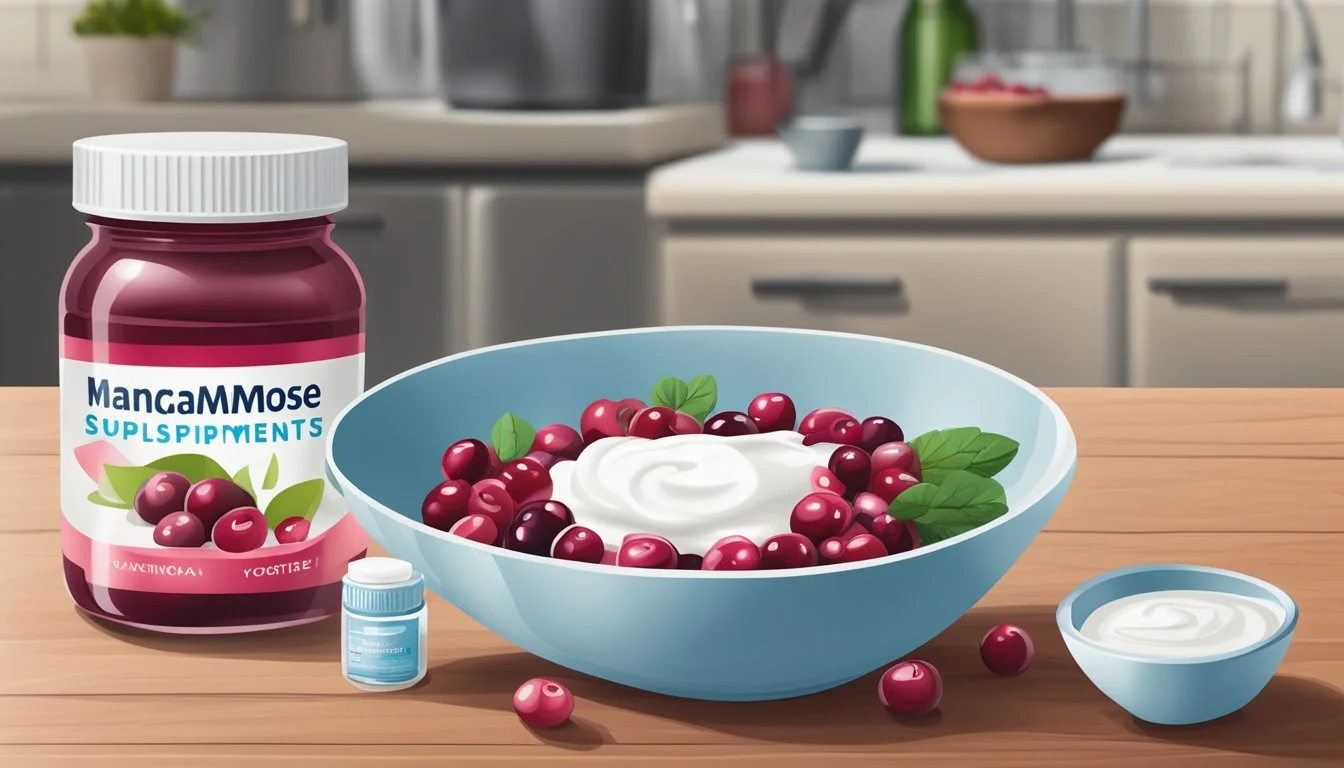UTI-Fighting Foods to Support Urinary Health
Urinary tract infections (UTIs) are common and can cause significant discomfort and inconvenience. For those dealing with this condition, dietary choices can play a crucial role in both prevention and management. Understanding which foods to consume and avoid can aid in alleviating symptoms and potentially reducing the frequency of these infections.
There are various natural foods and drinks known for their potential benefits in combating UTIs. Maintaining a balanced diet with specific focus on certain nutrients can help support urinary health and provide relief from UTI symptoms.
1) Cranberry Juice
Cranberry juice is commonly recommended for urinary tract infections (UTIs). This recommendation is largely supported by research indicating its potential benefits.
Studies have found that cranberry juice may reduce the occurrence of UTIs in women with recurrent infections. The active compounds in cranberries, known as proanthocyanidins, can prevent bacteria from adhering to the bladder walls.
An effective daily dose is between 8-10 ounces (240-300 mL). It is important to choose unsweetened cranberry juice to avoid excess sugar intake, which can contribute to other health issues.
Drinking cranberry juice alone may not cure a UTI, but it can be beneficial as part of a holistic approach. It is always recommended to consult with healthcare providers for proper treatment.
2) D-Mannose Supplements
D-Mannose is a type of sugar commonly found in fruits like cranberries. It is often used as a supplement to help treat and prevent urinary tract infections (UTIs).
D-Mannose works by blocking certain bacteria that cause UTIs from sticking to the walls of the urinary tract. This mechanism helps in flushing out the bacteria during urination.
Supplements are available in capsule and powder forms. Each capsule typically contains around 500 milligrams, and individuals might take two to four capsules daily when treating a UTI.
Research indicates that D-Mannose can be an effective preventative measure, particularly in women prone to recurrent UTIs. Small studies have shown promising results in reducing the recurrence rate of UTIs.
Users should always consult a healthcare provider before starting any supplement to ensure it is appropriate for their individual health needs.
3) Probiotics
Probiotics can play a significant role in managing and preventing urinary tract infections (UTIs). Probiotics, which are beneficial bacteria, help maintain a healthy balance in the gut and urinary tract.
Certain strains of probiotics like Lactobacillus rhamnosus and Lactobacillus reuteri have shown promise in reducing the recurrence of UTIs. These strains work by preventing harmful bacteria from adhering to the walls of the urinary tract.
Incorporating probiotic-rich foods such as yogurt, kefir, and fermented vegetables can be beneficial. These foods not only support urinary health but also boost overall digestive and immune health.
Capsule supplements are another effective way to ensure an adequate intake of probiotics. Products like Jarro-Dophilus Women and Garden of Life Dr. Formulated Probiotics Urinary Tract + are recognized for their positive impact on UTIs.
Regular consumption of probiotics could lead to fewer antibiotic treatments and a lower risk of developing antibiotic-resistant bacteria. While not a replacement for medical treatment, probiotics offer a natural and helpful addition to a UTI prevention strategy.
4) Blueberries
Blueberries are a healthy and beneficial food choice for individuals dealing with urinary tract infections (UTIs). These berries are known for their potential to prevent bacteria from adhering to the lining of the urinary tract, a property similar to that of cranberries.
Rich in powerful plant compounds, blueberries may also support the immune system. These compounds can help reduce inflammation, which could further aid in managing UTI symptoms.
The fiber content in blueberries promotes overall digestive health, an essential aspect of a strong immune response. Better digestive health can indirectly contribute to reducing the frequency and severity of UTIs.
Including blueberries in the daily diet might offer additional benefits beyond UTI management. Regular consumption has been shown to lower blood pressure and reduce cholesterol levels, adding to their appeal as a healthy food option.
5) Garlic
Garlic has been used for centuries for its natural antibacterial properties. These properties make it a potential aid in combating urinary tract infections (UTIs). The active compound in garlic, allicin, has demonstrated effectiveness against a range of bacteria.
E. coli, the most common bacteria causing UTIs, can sometimes be inhibited by the antibacterial effects of garlic. Consuming garlic may help to reduce the bacteria's ability to thrive in the urinary tract.
Adding raw garlic to meals is one way to incorporate it into the diet. Some also opt for garlic supplements, which can provide the benefits without the strong taste. Both forms aim to harness garlic’s antimicrobial properties.
While garlic's potential health benefits are promising, it's important to proceed with caution. Consulting a healthcare provider before using garlic as a treatment is advisable, particularly if taking other medications.
Garlic isn't a standalone cure for UTIs but could be a supportive dietary addition. Maintaining a balanced diet and following medical advice remains crucial in managing and preventing infections.
6) Vitamin C
Vitamin C plays a significant role in supporting the body's immune system. It can help make urine more acidic, which may help kill infection-causing bacteria in the urinary tract. This can be beneficial in preventing urinary tract infections (UTIs).
Including Vitamin C-rich foods in the diet is an effective way to boost intake. Foods high in Vitamin C include citrus fruits like oranges, lemons, and grapefruits.
Other sources of Vitamin C are kiwi, bell peppers, strawberries, and broccoli. For those looking for a more potent dose, Vitamin C supplements can be considered.
Regular consumption of these foods or supplements can support urinary tract health. Studies indicate that a daily intake ranging from 500mg to 1000mg of Vitamin C can be helpful.
Using natural sources of Vitamin C not only aids in preventing UTIs but also comes with additional health benefits. It's always advised to consult with a healthcare provider before starting any supplementation.
7) Pineapple
Pineapple can be a beneficial addition to the diet for those dealing with a urinary tract infection (UTI).
This tropical fruit contains an enzyme called bromelain which helps reduce inflammation. The anti-inflammatory properties of bromelain can aid in alleviating some of the discomfort associated with UTIs.
Pineapple is also rich in vitamins and minerals. Its high water content helps in staying hydrated, which is crucial for flushing out bacteria from the urinary tract.
Consuming fresh pineapple or pineapple juice can be a helpful, natural option to support UTI management. Always opt for fresh pineapple over canned versions that may contain added sugars.
8) Asparagus
Asparagus is a nutrient-rich vegetable that can support urinary tract health. It contains a variety of vitamins and minerals, including vitamins A, C, E, and K, as well as folate, iron, and copper.
One notable aspect of asparagus is its ability to boost the immune system. Studies have shown that asparagus roots can enhance immune function, potentially helping to fight off infections, including those affecting the urinary tract.
In addition to its immune-boosting properties, asparagus acts as a natural diuretic. This means it can help increase urine production, which aids in flushing out bacteria from the urinary tract. This can be particularly beneficial in reducing the risk of urinary tract infections (UTIs).
Asparagus also contains compounds that have antioxidant and anti-inflammatory properties. These compounds can help protect the urinary tract from damage and inflammation, supporting overall urinary health.
Consumption of asparagus must be moderated. Some people might notice a distinct change in urine odor after eating asparagus, which is harmless. If foul-smelling urine persists, medical advice is recommended, as it can indicate more serious conditions.
Including asparagus in a balanced diet can be a tasty and nutritious way to support urinary tract health. Consuming it regularly may contribute to preventing and managing UTIs.
9) Fermented Foods
Fermented foods can play a significant role in preventing and managing urinary tract infections (UTIs). These foods contain beneficial bacteria known as probiotics, which can help maintain a healthy balance of gut flora and combat harmful bacteria.
Examples of fermented foods include yogurt, sauerkraut, kimchi, kefir, and pickles. These foods are rich in Lactobacillus, a strain of bacteria that has been shown to reduce the risk of UTIs.
Including a daily serving of fermented foods in the diet may help boost the body's natural defenses against infections. For those already undergoing antibiotic treatment for a UTI, consuming probiotics can help replenish the good bacteria in the gut, which antibiotics might deplete.
Probiotics can also be taken in supplement form if fermented foods are not readily available. It's important to choose high-quality supplements that contain multiple strains of bacteria for maximum benefit.
10) Green Tea
Green tea is noted for its potential health benefits and its role in managing urinary tract infections (UTIs). Compounds in green tea, particularly polyphenolic catechins, have demonstrated antibacterial effects that may help combat the bacteria responsible for UTIs, mainly Escherichia coli.
The catechin epigallocatechin (EGC), found in green tea, serves as a natural antimicrobial. When consumed, EGC is excreted in urine, where it may aid in targeting and reducing bacterial presence in the urinary tract.
Healthline and GoodRx report the effectiveness of green tea’s compounds in managing antibiotic-resistant bacteria, making it an excellent supplement to conventional treatments. Research suggests that consuming green tea can help boost the body’s defense against infections.
Including green tea in the diet might provide additional support for people dealing with recurrent UTIs. It is crucial, however, to complement green tea with prescribed medications, as it is not a standalone cure. Consulting a healthcare provider before making any significant changes to one's diet is advisable.
Understanding UTIs
Urinary Tract Infections (UTIs) are common infections that affect the urinary system, which includes the bladder, kidneys, ureters, and urethra. They are often caused by bacteria entering the urinary tract.
Causes of UTIs
UTIs are primarily caused by bacteria, with Escherichia coli (E. coli) being the most common culprit.
These bacteria usually come from the digestive tract and enter the urinary tract through the urethra. Certain factors can increase the risk of developing a UTI, including sexual activity, poor hygiene, certain types of birth control, and having a suppressed immune system.
Women are more susceptible due to their shorter urethra, which allows bacteria quicker access to the bladder. Catheter use can also introduce bacteria into the urinary tract, leading to infections.
Symptoms of UTIs
Symptoms often include a strong, persistent urge to urinate, a burning sensation during urination, and passing frequent, small amounts of urine. There may also be cloudy or strong-smelling urine, and in some cases, blood in the urine, causing it to appear red, pink, or cola-colored.
Pelvic pain in women and rectal pain in men are also common symptoms. Fever, chills, and back pain can indicate a more serious infection that has reached the kidneys. If any of these signs are present, it is important to seek medical attention promptly.
Dietary Modifications to Prevent UTIs
Certain dietary habits can significantly impact the risk of developing urinary tract infections (UTIs). Incorporating appropriate fluid intake and selecting specific foods can help maintain urinary tract health.
Hydration
Staying well-hydrated is crucial in preventing UTIs. Drinking at least 50 ounces (about 1.5 liters) of water daily helps dilute urine and flush out bacteria. Consistent hydration ensures that the bladder is regularly emptied, reducing the likelihood of bacteria buildup.
Besides water, herbal teas and clear broths can also contribute to fluid intake. Avoid beverages high in sugar or caffeine, as they can irritate the bladder.
Foods to Include
Certain foods have properties that can help fend off UTIs. Probiotics such as plain Greek yogurt and fermented foods like sauerkraut and pickles introduce beneficial bacteria, which can help control harmful bacteria in the urinary tract.
Cranberry products and D-Mannose supplements may also be useful. They work by preventing bacteria from sticking to the lining of the urinary tract. A diet rich in fruits and vegetables can also provide the necessary vitamins and antioxidants to support overall bladder health.
Foods to Avoid
Some foods can aggravate the bladder and potentially increase the risk of UTIs. Spicy foods are known to irritate the bladder, so they should be consumed in moderation or avoided if prone to UTIs.
Acidic fruits like oranges, lemons, and limes may also cause irritation, particularly during an active infection. Be mindful of consuming caffeinated beverages and sodas, as these can lead to dehydration and bladder irritation, further exacerbating symptoms or risks.







